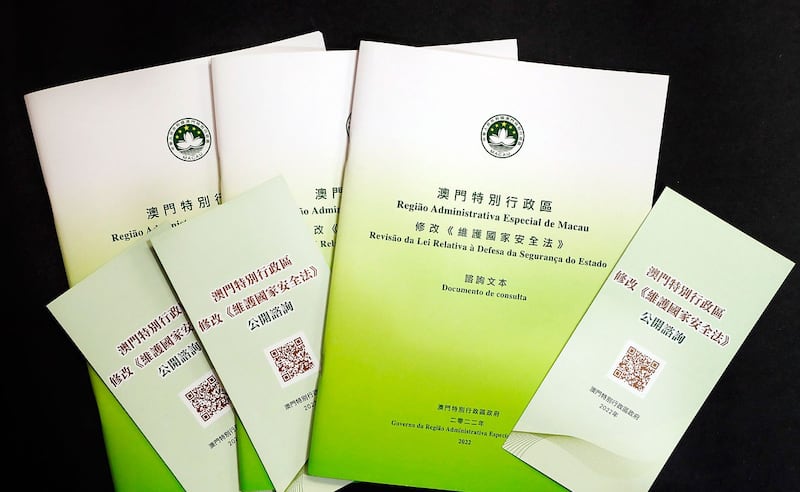Plans by authorities in Macau to amend the city's national security law were likely sparked by the recent visit of U.S. House Speaker Nancy Pelosi to the democratic island of Taiwan, and could result in a crackdown on civil society and the criminalization of speech, analysts told RFA.
Macau's security chief Wong Sio Chak said the amendments are intended to tackle "complicated and volatile security risks" in the context of overall national security.
The amendments will make it easier for police to collect intelligence and implement "preventive measures," Wong told a recent news conference launching a public consultation for the amendments.
They will also allow the authorities to "effectively prevent interference by external forces," Wong said.
The ruling Chinese Communist Party (CCP) insists that repeated waves of mass popular protest movements in Hong Kong calling for fully democratic elections and other freedoms in recent years were instigated by "hostile foreign forces" seeking to undermine CCP rule by fomenting dissent in Hong Kong.
It first imposed a draconian national security law on Hong Kong in the wake of the 2019 protest movement, ushering in an ongoing crackdown on peaceful dissent and political opposition that has seen more than 1,000 arrests under the law, with thousands more under colonial-era public order and sedition laws.
Macau is now looking to broaden categories of offense under its existing security law, changing "subversion of the central government" to "subversion of state power", adding " "instigating or supporting the crime of rebellion," and giving authorities broader powers to intercept communications.
The amendments will also allow the government to issue exit bans on people involved in national security cases, and give police the power to require information from individuals and organizations suspected of "endangering national security."

'Splitting the country'
Many civil society groups in Hong Kong have faced prosecution for refusing to hand over data on their activities and members, while others have disbanded pre-emptively following public criticism in the CCP-backed media, citing the need to protect everyone involved.
Wong said Pelosi's Taiwan visit had indicated the need to beef up legislation around "splitting the country," meaning any words or actions that don't recognize China's territorial claim on the island.
While Taiwan has never been ruled by the CCP, nor formed part of the 72-year-old People's Republic of China, Beijing insists on "unification" despite repeated opinion polls showing that the island's 23 million people have no wish to give up their sovereignty or their democratic way of life.
"There has been a significant increase in various risk factors, both predictable and unforeseen," Wong told an Aug. 22 news conference in Macau.
"Pelosi's recent visit to Taiwan showed very clearly how external forces are constantly interfering in China's internal affairs and violating our country's security," he said. "Preventing such external interference will be a key direction [of the amendments]."
Unlike Hong Kong, where the process was stalled amid mass protests in 2003, Macau drafted its national security law from 2004, based on Portuguese and Italian legal concepts, and then chief executive Edmund Ho promised it wouldn't be used to clamp down on free speech.
"[Currently], to prove subversion or secession, you have to show that violence or other illegal methods were used, so speech can't be criminalized," former pro-democracy lawmaker Au Kam San told RFA.
The new amendments will likely change all that.
"The problem for democrats is that they could run into very big problems just for criticizing the Macau or Chinese government in a restaurant," Au said. "It could be enforced in a very random way, causing terrible problems."
End of opposition and dissent
Au said if Macau goes the way of the national security crackdown in Hong Kong, it could mean the city loses the last of its political opposition and dissenting voices.
Macau journalist Roy Choi agreed, saying anyone in contact with overseas officials or organizations will likely be a target once the amendments become law.
"In the past, if you had contact with a foreign government or political organization, the National Security Law could be invoked, but now they want to remove the phrase 'political organization,' and change the word 'foreign' to 'outside'," Choi said.
"[This means that] any contact by NGOs or non-political groups in Macau may have with overseas groups could come under the national security law, which will have a much broader reach," he said.
"This will make communications between Macau residents and overseas groups much more fraught with anxiety, which will affect the work of NGOs," Choi said.
Choi said that while the Macau authorities may not choose to launch a mass campaign of arrests and prosecution in the style of Hong Kong, the 100,000 Macau residents who hold Portuguese passports may start thinking about emigrating, particularly if children or young people are involved.
Taiwan-based current affairs commentator Johnny Lau said the special mention given to Pelosi's Taiwan trip at the press conference showed where the CCP's worries lie.
"Pelosi's visit to Taiwan must be behind this plan to strengthen Macau's national security law," Lau told RFA. "Most people look at U.S. interests in Hong Kong, but not everyone notices that the U.S. also has many interests in Macau."
"Actually U.S. interests in Macau are somewhat destructive, such as the U.S. gambling companies," he said. "From Beijing's point of view, they are taking precautions and defending against ... other channels of influence in Macau that could be behind them."
Lau said the Macau authorities have yet to invoke their existing national security law, which took effect in March 2009.
Translated and edited by Luisetta Mudie.
